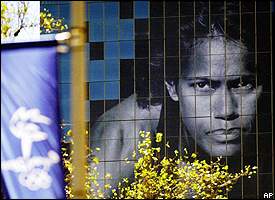



|

|
Tuesday, September 19
Games let Freeman promote her people's plight
By Adrian Wojnarowski
Special to ESPN.com
SYDNEY, Australia -- The eyes of Cathy Freeman hang high on the side of a 50-story
structure overlooking the sleepy walkways of Darling Harbour, a steely,
stoned-face stare to welcome the world to the Summer Games. Before her
country had called her to the steps of the torch lighting inside Olympic
Stadium on Friday night, moving the calm, cool sprinter to tears, it was
perfectly fitting she had been introduced as a larger than life presence over
the proceedings.
|  | | Australian sprinter Cathy Freeman is using the Sydney Games as an opportunity to discuss "The Stolen Generation" of Aborigines. |
Australian athletes have a history in the Olympics of championing human
rights issues, going back to Mexico City in 1968, when an Australian runner,
Peter Norman waited to march to the medal stand with Americans John Carlos
and Tommie Smith and asked: What can I do? Carlos and Smith wore the black
gloves and the Aussie wore a patch promoting human rights. For the struggle
these two black American sprinters were fighting for on U.S. soil, there was
a frightening policy presumably coming to a close in Australia.
The children of indigenous, black Aboriginal minority had suffered a 60-year-old government policy of taking children -- kidnapping, really -- out of
mother's arms and delivering them to strangers under a misguided premise of
"learning the Australian way." The result has been called "The Stolen
Generation" and it touched Freeman's family, just as did it thousands of
Aboriginals in Sydney. Finally, there is a star athlete of social
significance and conscious arriving at the Olympic Games.
Freeman understands the importance of these Games in Sydney to raise a global
understanding to the past and plight of her people. If she's costing herself millions in Australian endorsements, she'll live with it.
When she exploded on the international scene, Freeman didn't have her
mind on cultivating an image for the endorsements, but generating an
awareness worldwide of her people's plight. At the 1994 Commonwealth Games,
she jogged two victory laps -- one with the Aboriginal flag, one with the
Australian. Furious officials chastised Freeman and warned her to never do it
again. Well, she won the 200 meter race, too, and wrapped herself with the
Aboriginal flag for another turn on the track.
Thus far, Sydney has been a gracious host to the Games, thus far, a
perfect choice considering the climate, beauty and passion of the people. And
yet still, when you get past the pleasantness, there's something else
simmering below the surface. The Aboriginals, a minority of 390,000 are
largely living in third-world conditions with high mortality rates and
employment. They settled Australia thousands of years ago, but eventually
found themselves stripped not just of property, but their children, too.
When an Australian government official insisted the Stolen Generation of
children was something of an overstated myth, Freeman reacted with a sharp
public rebuke this year. Once more, she had stepped into Australia's most
volatile debate and tremors will chase her right to the starting line of the
400 meters.
"I was so angry because they were denying they had done anything
wrong," Freeman said. "The fact is, parts of people's lives were taken
away -- they were stolen. I'll never know who my grandfather was. I
didn't know who my great-grandmother was. And that can never be
replaced."
Cathy Freeman can't change attitudes in Australia with the lighting of a
torch and the winning of a gold medal alone. Just maybe, she can start the
discussion again. There are issues and beliefs too deeply ingrained in the people
of Australia to think the Olympics can be anything but a beginning.
Just spend a week here, listen to the people on each side, and it's easy to
understand that there's so little common ground between these people. Still,
Cathy Freeman's one of the stars of these Games, and Australia has never had
an Aborigine standing so tall on the Olympic field for it. She has medals to
win, issues to share and, just maybe, the timing is right for it to go
hand-in-hand in Australia.
Adrian Wojnarowski is a columnist for the Bergen (N.J.) Record and a regular
contributor to ESPN.com
|  | |
ALSO SEE
Kreidler: Hoop it up -- quietly
Wojnarowski: Look closely, see the magic
|







